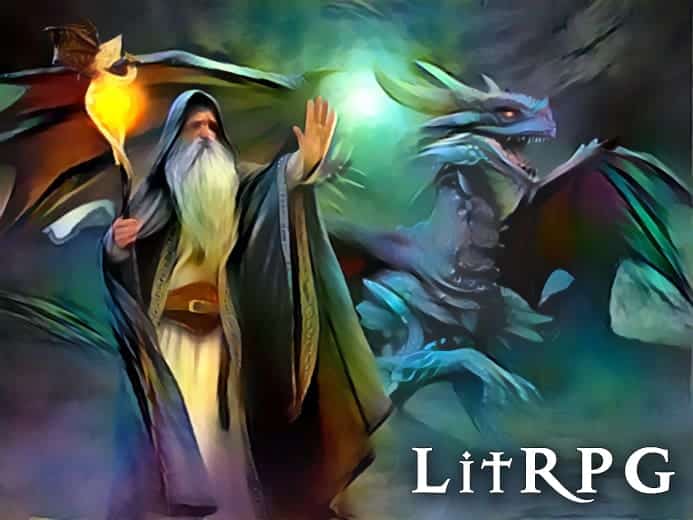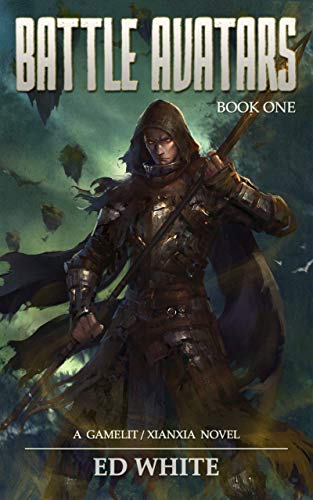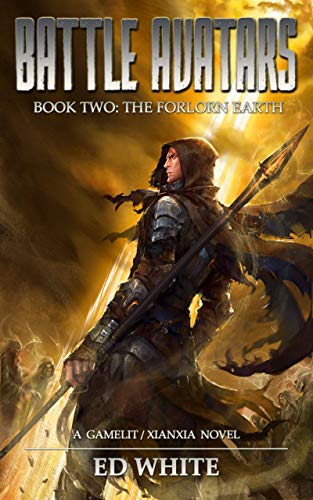New guest post by Ed White, LitRPG Author!
What’s it like to write in a shared universe? I know you are probably thinking, “what’s that got to do with LitRPG or GameLit?” The answer: plenty more than we guessed all those years ago.
Hello, my name is Ed White, author of the LitRPG/Cultivation series Battle Avatars, and a member of a studio of like-minded writers and artists. Many years ago, we began this creative journey separately. For some of us, the journey began as kids reading comics, writing short stories and/or doodling and drawing heroes and villains, adventures and battles.
That’s what it was like for me: all of the above. I loved it. Cartoons inspired me first, along with the few sci-fi and fantasy shows to grace the networks. There were some great cartoons—the giants of the toy industry, the early anime to hit the USA, and some European fusions. Of course, we can’t forget all the comics of the Big Two—I devoured them.
With it all swirling in my head, I sketched and drew through drawing pads and reams of loose paper of all sorts—any damn sort—and began my own little multiverse (not so little anymore).
A multiverse? What does that have to do with LitRPG? If you’ve read Battle Avatars, you know I love a mystery (maybe too much: it will be okay, books two and three reveal all). I describe my early stories as a multiverse because that is what they became. In those early days, I did not connect everything I created—some, but not all and as years passed, the connective tissue became evident.
Then I discovered Dungeons & Dragons. Oh my! I don’t know who gave me the red Starter Set, but boy did I love the cover of the dragon and bold warrior caught in the instant their fight started! That influenced a tale or two set in the Battle Avatars period. Wait, isn’t Battle Avatars the “Battle Avatars period”? Yes, it is and it is not… spoilers!
For about a year, it was hard to get a D&D game together: friends moved away and we changed schools too, but by then, Advanced D&D was available.
That’s when the games began! What adventures we had, creating new stories and characters, with many hours and days lost playing D&D (and to date myself: we also played far too much Nintendo and Gameboy). The video games were a touch behind concerning true RPG and adventuring, but they caught up soon enough and so did I.
Once online, video games allowed us to hang out and play without the limitations of distance, even with old friends who moved away. Some might say gaming can isolate you, and it can, but I found it reconnected us and gave us new adventures.
Try my AI Tabletop RPG generators...and an extensive library of content!
A few years later, we decided to pool our ideas and resources together to create and publish comics. Each of us entered the creative industries, whether we created advertisements, animation, copy-editing, articles, or content. These were not the only jobs we held and we missed the fictional aspects in each of those, save for the lucky few who entered the animation industry. Unfortunately, even in the animation industry, the production line of creation removed the personal creative output and freedom.
⚔️ Fantasy RPG Random Tables Books
Make life as a Gamemaster easier…
If you play Dungeons & Dragons, Pathfinder, or other fantasy RPGs, this
RPG random tables series
is packed with encounters, NPCs, treasure, and more. Available in eBook or print—either way, you’ll have a wealth of adventure ideas at your fingertips.

Together, we looked to comic books. There was a massive boom in the comics industry, with many publishers popping in and out of existence. Creating comics is a lot of work, but there was a bigger obstacle: which character was the strongest character? My hero can beat your hero. How do you describe magic? We needed a solution and consistency to the stories and plots. We wanted to have consistent power levels, measurable growth or loss, and a system to follow.
What could we do to stop the potential comic store style arguments between us as our characters met for the first time? For readers of comics, these arguments are common among fans: who is stronger, who is better—Superman or Hulk, Batman or Captain America? It wasn’t simply my characters interacting; we each had our own characters, Earth agencies, aliens, antagonists, and supernatural creatures created before we decided to publish comics.
One obvious solution was to create all new characters solely within the publishing arena, to protect ourselves and to design it all from the ground up. Starting from scratch would be simpler and better organized, but that was boring. It isn’t exciting to be disorganized; it was boring not having a true multiverse with characters that might never have met, or did—creating untold stories waiting to be told.
Get to the LitRPG, Ed!
We created a system, a gaming system, based on those we experienced for hours on end. We developed the system to function with mixed genres and we recorded the stats for all of our principle characters—be they hero or villain, human or other—including a basic catalog of skills, abilities, and the like. The gaming mechanics operated behind the scenes, supporting each story, alongside the needs of plot and character direction. Sometimes these mechanics provided answers to story questions and other times providing what we call an epiphany: a moment where we realized there was more going on than we created or plotted up until that realization. In other words, the stats showed what might be missing.
How it worked: we created classes for each of our character types, vocations for jobs, crafting rules, means to gain followers, and all the rules you would expect. These “rules” never directed or governed the story, but it really helped us understand the risks and threats to a character facing a troop of antagonists that qualified as a deadly encounter—no plot armor here, we would need a solid story if the hero or other character type survived. Primarily, as you might guess, the stats began and usually served as a means to rank our various characters and manage any battles taking place. These fights were often “superhero” conflicts, but we also told stories in a wide variety of eras and genres (sometimes we bend those two definitions).
For me, my MC might meet an MC or antagonist created by one of my studio partners, and we knew their skill sets and “levels”. The characters exhibited true growth. We might tell a flashback, scaling back the skill tiers and rankings of the characters in their younger years. We might even show characters who lost their abilities—being wounded or otherwise—and know what capabilities they once had. We never rolled the dice to see who would win, but we often consider it. A book written by rolling the dice would certainly be fun.
There was talk of developing this system further—forging it into a proper game. Our history and contacts in broader mediums outside of comics included a few employed in gaming. This was long before the days of Kickstarter and Indiegogo and we knew there was little hope of seeing it come to fruition. Even so, that wasn’t the only concern, the idea is cool, but I want to create stories. Don’t get me wrong, I never got into any of this for math, and never imagined the chance to develop tabletop or digital games. Stories drive me: writing the next story, ever growing and ever exploring.
A gaming system offers endless story possibilities, but I hope you understand what I mean. Animation and game development is an endless loop of conceptual work in a factory system with many dead ends. Without investors in these expensive industries/mediums, the work often ends abruptly. Many a project ended, and while none of these related to our system, I was always glad for the experiences learned during my involvement, however limited.
LitRPG and GameLit.
Two years ago, Dragon Ball Super aired and streamed, igniting my nostalgia for the original, unedited Japanese Dragon Ball Z episodes. Already exploring the emerging Kindle market, I looked to see whether the Kindle market supported Taoist Cultivation stories. What I found instead (besides the infamous and awesome Cradle series), was LitRPG.
One of my fellow authors writing outside the studio mentioned his own books and I had a read. There are so many possibilities: lost in the game, portal fantasy to a game world, a world governed by gaming mechanics, and so forth—I was hooked. Then it dawned on me. Here was a chance to highlight the structure behind my stories. LitRPG puts the system on display, front and center—the stats, the skill trees, and more.
Stories of the ancient Earth, the present, and the future—any setting we wished to play in an RPG was available across the multiverse. Any era was open: a medieval world or one set in an unknown era of sword and sorcery. Modern day or post-apocalyptic, I have stories in all of those settings and now I continue to share them with all of you. LitRPG lets me embrace the final piece of those early building blocks, the many inspirations that made me the author and artist I am today!
⚔️ Fantasy RPG Random Tables Books
Make life as a Gamemaster easier…
If you play Dungeons & Dragons, Pathfinder, or other fantasy RPGs, this
RPG random tables series
is packed with encounters, NPCs, treasure, and more. Available in eBook or print—either way, you’ll have a wealth of adventure ideas at your fingertips.











